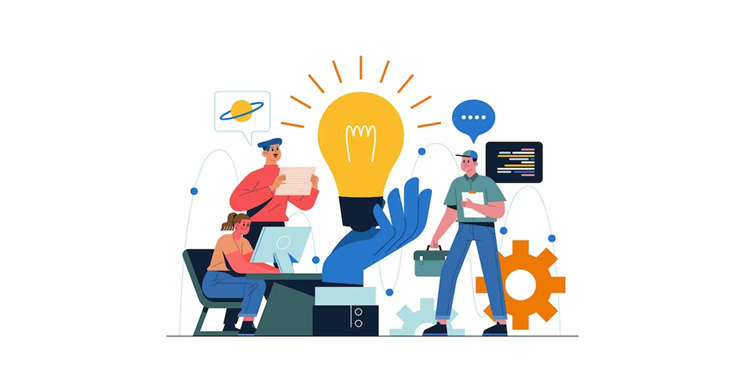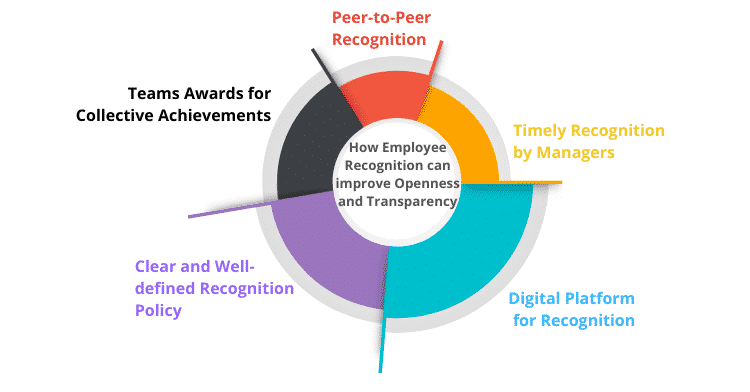1. A workplace culture of openness and transparency fosters trust, collaboration, and alignment with business goals, ultimately leading to increased productivity, employee retention, and innovation.
2. Employee recognition programs are vital to fostering this culture by providing timely, fair, and visible recognition from managers and peers for individual or team achievements.
3. Clear recognition policies and digital platforms ensure fairness and transparency, motivating employees and reducing professional rivalries.
4. Overall, such a culture of recognition drives employee happiness, engagement, and organizational growth.
Openness and transparency in the workplace play a crucial role in organizations’ operational effectiveness and business growth. Employee recognition is a powerful tool that organizations can harness to create a culture of openness and transparency.
In a survey conducted by TinyPulse, the culture of openness emerged as the top factor for employee happiness.
A culture of transparency and openness helps build trust and commitment among employees.
Here are the key benefits of creating such a culture:

An open and transparent culture fosters employee trust, leading to a more positive and productive work environment.

In such a culture, employees are likely to collaborate more effectively with one another, experiencing fewer issues of distrust and miscommunication.

Such a culture is likely to drive employee engagement and happiness, which in turn can reduce the turnover rate.

Openness and transparency encourage better communication between employees and management, leading to a better understanding of business goals

Openness and transparency empower employees, making them more likely to share valuable ideas and suggestions.
A well-developed employee recognition program can help organizations build a great culture of transparency and openness.
It is how it can work:
1. Timely Recognition by Managers
2. Peer-to-Peer Recognition
3. Teams Awards for Collective Achievements
4. Clear and Well-defined Recognition Policy
5. Digital Platform for Recognition


Recognition of employees by their managers and supervisors provides regular and positive feedback to them for their good performance and achievements.
It can be an effective way to create an atmosphere of openness and transparency where good work is recognized promptly.

Appreciation by peers and social recognition help develop a culture of recognition in the organization, where employees genuinely celebrate each other’s success.
This results in greater openness and transparency, dissolving professional rivalries and unhealthy competition.

Recognizing the collective achievements of a group of employees in the form of team awards encourages greater information sharing and collaboration with the team.
Teams are likely to be open and transparent with each other once they realize they can create a significant impact and receive rewards for working in tandem.

Having a well-defined and documented policy for employee rewards and recognition, with clear eligibility criteria and guidelines, ensures the fairness and credibility of the entire system.
Employees are assured that they get an equal and fair chance of being recognized for their efforts and their contribution to business growth.

The use of a digital platform for employee recognition and integration with other internal platforms like Teams or Slack ensures transparency, fairness, and authenticity of the rewards system.
Employees have complete visibility of the list of award winners and their achievements.
It promotes greater transparency and openness within organizations, as other employees feel motivated to emulate the award winners, perceiving the system as credible and genuine.
Read Building a Culture of Appreciation through Employee Recognition

It builds trust, enhances collaboration, increases productivity, retains employees, and fosters innovation by aligning teams with shared goals.
Recognition—when delivered timely, fairly, and visibly—signals to everyone what behaviors the organization values, creating clarity and a sense of fairness that fuels transparency.
Quick, specific acknowledgment from managers shows respect and openness. It reinforces that good performance is visible and valued immediately.
Peer recognition fosters a culture in which employees openly celebrate one another, reducing unhealthy competition and building trust.
Recognizing collective achievements reinforces information-sharing and teamwork—people see that collaboration is noticed and rewarded.
When criteria and guidelines are explicit and well-documented, employees trust that recognition is fair. It reduces ambiguity and suspicion.
Digital tools—especially when integrated with collaboration platforms like Slack or Teams—make achievements visible to all, ensuring fairness, encouraging emulation, and building credibility.
It amplifies employee happiness and engagement, which, in turn, drives sustained performance, innovation, and business growth.
Yes. To foster trust, organizations should openly share performance criteria and feedback processes. This clarity helps employees understand expectations and increases accountability.
Incorporate clear criteria, manager and peer recognition, visible platforms, and leadership participation to ensure everyone sees and understands how success is recognized.
Organizations can build a culture of openness and transparency through employee recognition, which can in turn lead to higher productivity, innovation, and business growth.

Lead author: Sagar Chaudhuri, the Co-Founder and CEO of HiFives. He is an HR Tech Evangelist with over 25 years of experience in both corporate and entrepreneurial settings. Previously, Sagar has held leadership roles with companies such as Genpact, Infosys, and ICICI Bank. He has an engineering degree from IIT Kharagpur and an MBA from IIM Lucknow. Connect on LinkedIn
To stay updated on the latest HiFives blogs, follow us on Twitter (@MyHiFives)